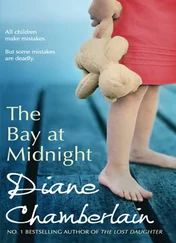“I was looking for the Coast Guard station.”
“Coast Guard station?” the woman said. “You mean a life-saving station?”
Gina recalled that the Coast Guard stations had originally been home to the life-saving crews. “Yes,” she said.
“The nearest are up in Ocean Sands or down in Sanderling,” the woman said, toweling off her arms.
Gina was confused. “I thought there was one right about here.”
The woman shook her head, then a spark came to her eyes. “Oh,” she said. “I know the one you mean. I’ve read about it, and it was along here, you’re right. But it was lost in a storm in the sixties, I think. That was before I moved here, so I’m not sure exactly when. A lot of erosion along here since then.” She waved her hand to take in the beach. “It’s changed a lot even since I moved here.”
“Ah, that figures,” Gina said, disappointed. Storms, storms, storms. She was coming to realize that weather was the source of devastation around here. “Well, thanks,” she said with a wry smile. “I guess I can stop looking now.”
“Sorry,” the woman said. She bent over to pick up her beach bag. Straightening again, she looked at Gina.
“You have a nice evening,” she said, then waved as she walked toward a path leading into the vegetation near the beach.
“You, too,” Gina said.
She watched the woman disappear into the trees, then turned and headed back toward Kiss River.
She walked along the beach, her feet slapping in and out of the shallow waves, feeling alone. When she reached the lighthouse again, she stood in knee-high water, staring out at the sea. She thought of that woman on the beach, walking out of the water. Gina could swim, but she had never before been in the ocean. The Pacific off the coast of Washington was far too cold to swim in. Her eyes searched the water in front of her. What if the lens was just below the surface? Maybe it would not even need to be raised to suit her purpose.
She’d brought no bathing suit with her, since swimming had certainly not been part of her plan when she drove east from Washington. But she had on shorts and a T-shirt and no one was around to see her make a fool of herself. Slowly, she started walking into the water. It was nearly high tide, probably not the best time for a search, but the sea was rarely this calm. She would do this methodically, she told herself. She’d walk in an arc around the ocean side of the lighthouse, expanding the arc each time she changed direction. The idea suddenly seemed amazingly simple. The lens weighed three tons. Even if it had broken apart when it fell into the sea, the pieces should still be large enough for her to find.
She walked quickly at first, whisking her hands through the water in all directions, hoping to feel something hard and smooth. Then she had to slow down as the water grew deeper. Occasionally, her feet stumbled over chunks of brick and mortar, but nothing resembling glass. Finally, she was deep enough that she was half swimming, half treading water, trying not to think about sharks and riptides. She’d never experienced either of them, but had certainly heard enough about both hazards. A couple of times, she held her breath and dipped her head below the surface of the water, opening her eyes to look around her, but she couldn’t see more than a couple of feet away from her in any direction and the salt burned her eyes.
She’d been in the water a long time when she turned to look behind her and was stunned to see how small the lighthouse had become. A little jolt of fear shot through her. She was far out into the sea, but still, it was not that deep here, perhaps only a couple of feet above her head, and she calmed herself with that thought as she swam toward shore, a heavy aching in her chest. She had covered a lot of territory out here. She had touched every speck of the sea bottom with her feet and found nothing. The lens, with its tie to both her past and her future, had simply disappeared.
Thursday, March 19, 1942
THE MOST SHOCKING AND HORRIBLE THING happened to me today. I am not even sure I can write about it because words just can’t tell how awful it was, but I think it might make me feel better if I write it down, so I will try. It’s midnight now and I can’t sleep, anyway. I’m afraid if I go to sleep, I’ll have nightmares.
I like to climb trees. I always have. Mama scolds me about it, saying that I think I’m so grown-up and all, but I am still just a little kid who climbs trees. Well, I don’t know if I’ll ever outgrow that, or even if I want to. I plan to climb trees with my own children someday. Anyhow, I like sitting up in the trees above the beach just south of Kiss River. There is a wonderful tree there, not very tall, with its branches spread out almost like a platform about ten feet above the ground, and I usually sit up there after school, eating an apple or something and sometimes reading. And to tell the truth, I sometimes sneak out of the house and sit up there at night, because that is the stretch of beach that Jimmy Brown patrols and I like watching him. I would die if he ever knew I was there, but the trees are thick and I am sure he can’t see me at night, even if he turned his flashlight on me.
So today, after school, it was really warm out and not as windy as usual and I couldn’t wait to get up in my tree. So I took the book I’m reading now (The Grapes of Wrath ) and went up in the tree. On the beach below me were pieces of wood, nearly covering every inch of sand, and I knew they were probably from one of the ships that had been sunk out to sea. I knew that bodies sometimes washed up with that salvage, though I’d never seen any. Just as I was thinking how glad I was about that fact, I saw some blue and white cloth off to the side of the wreckage. I stared at it, and soon I could make out that it was someone’s shirt, and that someone was still in it!
My first thought was to get Daddy, but I thought I’d better check on the person before I ran off, just on the off chance he might still be alive and need help. I was so scared my knees were actually shaking, but I climbed down the tree and walked out to the beach, trying to find places to put my feet amongst the pieces of wreckage from the ship. The man was lying facedown in the sand and a distance from the wreckage. His shirt was blue and white stripes and his pants were brown. And he had on shoes and socks. I will remember every detail about him until the day I die. I knew he was dead. I knew it. Yet there was this little part of me that thought I had to make absolute sure. So I carefully tucked my foot underneath his ribs and rolled him over. And then! Oh my God! His throat had been cut! The blood was brown and it was all over his shirt and in a wide, revolting gash across his throat. His head had nearly been cut off, I think. I screamed, and then I started running. Not toward home and Daddy, but toward the Coast Guard station. I had to stop once because I thought I was going to retch, but I managed not to. I couldn’t get that man’s face out of my mind.
At the Coast Guard station, I immediately found Mr. Hewitt and told him what I’d discovered. We (me, him and Ralph Salmon, who is another one of the Boston boys and nice, but no Jimmy Brown) climbed in the Coast Guard jeep and headed back down the beach. There was wreckage all along the beach. It looked so different from usual that it took me a minute to figure out when we reached the right spot. While we were bouncing over the sand, I kept asking Mr. Hewitt the question that was driving me crazy. If the Germans torpedoed the ship, which they would have done from a distance away, how did they also manage to cut the man’s throat? Mr. Hewitt didn’t answer me. He was driving, just looking straight ahead of him at the beach, a frown on his face and his lips tight, and I guessed he was trying to figure out the same thing.
Читать дальше












